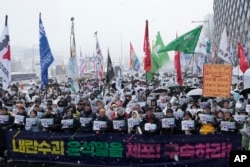US Secretary of State Antony Blinken on Monday opened a visit to crisis-hit South Korea where he will delicately seek to encourage continuity of the deposed president’s policies, but not tactics.
Blinken arrived in the snowy capital for what will likely be his final trip as America’s top diplomat before President-elect Donald Trump’s inauguration.
He will meet his counterpart Cho Tae-yul on Monday, the same day an arrest warrant expires for suspended President Yoon Suk Yeol who unsuccessfully tried to impose martial law on December 3.
Blinken highlights President Joe Biden’s efforts to build alliances and will next visit Tokyo, making it crucial for his advisers not to snub South Korea, which has tense and often competitive relations with Japan, which is also home to thousands of American troops. .
Yoon had once been a darling of the Biden administration with his bold moves to turn the page on friction with Japan and his vision of a greater role for South Korea on global issues.
Yoon joined Biden for a historic three-way summit with the Japanese prime minister and – months before declaring martial law – was chosen to lead a global summit on democracy, a signature initiative of the outgoing US administration.
Yoon also charmed his hosts during a state visit by singing “American Pie” at a White House dinner.
Blinken may face some criticism from the South Korean left over his visit, but he should be able to weather the political crisis, said Sydney Seiler, a former U.S. intelligence officer specializing in Korea and now at the Center for strategic and international studies.
Blinken has a high enough profile to be above the fray and can stay focused on challenges such as China and North Korea, he said.
“Blinken can dodge many of these South Korean landmines relatively easily and contextualize them not as an attempt to help the ruling party or to artificially create a sense of normalcy where it would not otherwise exist,” he said. Seiler said.
In a statement, the State Department did not directly mention the political crisis but said Blinken would seek to preserve trilateral cooperation with Japan, which includes increased intelligence sharing on North Korea.
Blinken’s visit comes at a time of change for both countries, with Trump returning to the White House on January 20.
Paradoxically, while Biden worked closely with the conservative Yoon, Trump enjoyed a warm relationship with then-progressive President Moon Jae-in during his first term, who encouraged the US president’s groundbreaking personal diplomacy with North Korea.
The Biden administration has stressed since the crisis that it is reaching out to South Korean politicians across divides, amid uncertainty over who will lead Asia’s fourth-largest economy.
Progressive opposition leader Lee Jae-myung, who himself faces disqualification in a trial, supports diplomacy with North Korea.
But the former union activist also took different positions than Biden and Trump.
Lee criticized the deployment of the U.S.-made THAAD missile defense system, which Washington says is intended to protect against North Korea but which China views as a provocation.
The South Korean left has long advocated a tougher stance toward Japan following its brutal occupation of the Korean peninsula between 1910 and 1945.
U.S. officials said they had no warning of Yoon’s imposition of martial law, which pushed masses of protesters into the streets.
Blinken, speaking to reporters last month, said the crisis showed the strength of South Korea’s institutions built in the three decades since it adopted democracy.
“I think Korea is one of the most outstanding countries in the world in terms of the emergence of democracy and democratic resilience, and we will continue to look to Korea to lead by example,” he said. Blinken said.
USA voanews


